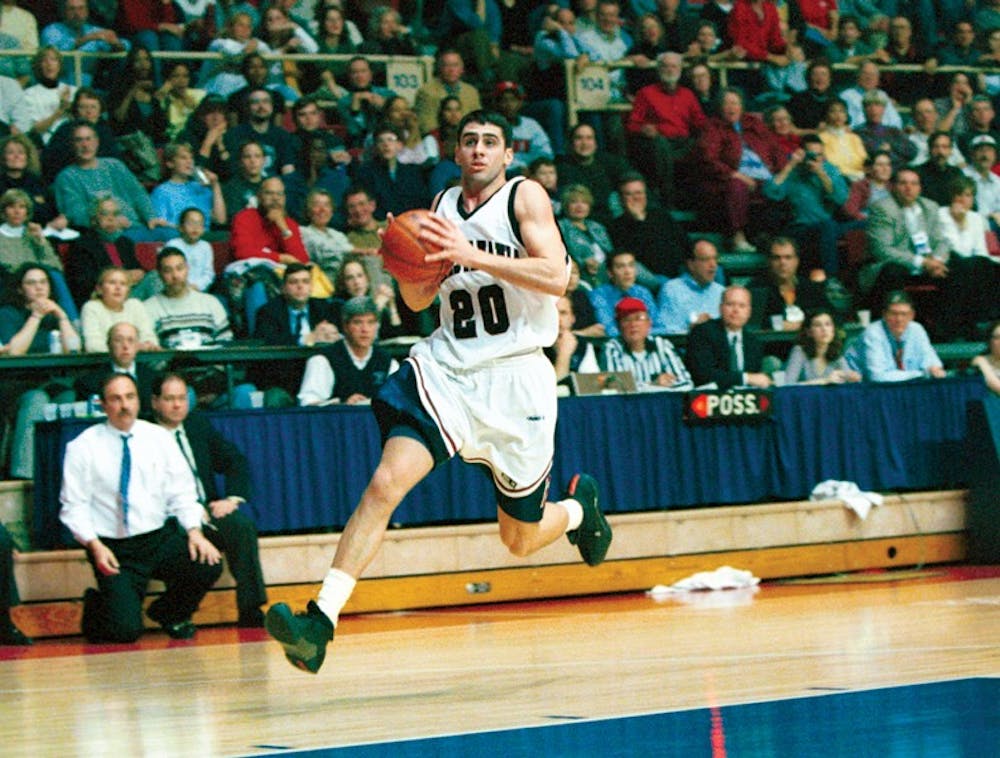
The DP caught up with former first-team All-Ivy Penn guard and current Colgate coach Matt Langel to see what it was like coaching under Fran Dunphy for seven years at Penn and Temple and how his relationship with former teammate and 2000 Ivy Player of the Year Michael Jordan propelled the Quakers to Ivy League Championships in 1999 and 2000. Oh, and childbirth drama at the Palestra.
Daily Pennsylvanian: Was it coach Dunphy, since you mentioned him, who took the lead in recruiting you at the time? How did that process work?
Matt Langel: It’s hard to remember the recruiting process, going through it. It’s obviously changed so much now. How much attention is paid to other recruiting classes with respect to student-athletes. And it’s all been sped up, sophomores are being recruited at a significant rate. Coach [Dunphy] went to a couple of my high school games, saw me in the summertime, checked in on the phone from time to time. Coach had a laid-back style to recruiting. He didn’t really harass you or occupy your time. He just kind of let you know how he felt, what his plan would be for you and let you and your family know about the process.
DP: Since you’ve gotten into coaching, has recruiting been something that has steadily gotten more involved each year with players of interest reaching back to now high school underclassmen, or is that just a process that varies as it goes along?
ML: On the nine years that I’ve been on this side of the game in coaching, I would say it’s absolutely something that has changed. But life changes, the world is changing, technology changes. The rules have changed — when you’re allowed to contact a kid, what means you’re allowed to contact them with, if you’re allowed to use text messaging. How many times you’re allowed to contact them, all those things are constantly changing. Recruiting has always been a part of college basketball and that’s never gonna change.
DP: Mike Jordan is someone you’ve obviously had a very successful basketball relationship with. How did you both complement each other on the court when you played at Penn together, and how has your relationship with him developed over the years?
ML: It’s significant, and I don’t really know if there’s words to do it justice. More important than anything is that I’ve known him for over half my life and he’s part of my family. My children call him uncle Mike. That’s the way we feel about him, and there’s nobody closer to us in the world.
How we complemented each other, it’s hard for me to say. There’d probably be better people to ask than that. I think that we were a pretty good balance. He was a competitive, very fiery guy. Maybe I was a bit more analytical, thought things through. He was an attack-first, energetic competitor. So maybe we balanced each other like that.
More than anything, I think we both loved the game and wanted to live up to expectations of those guys that came before us, and hang more championship banners in the Palestra. Our lives have remained close, and he means more to me as a person I value so much, who he is as a husband, as a dad, as a basketball coach. We come from opposite backgrounds. He grew up in the inner city under more difficult circumstances than I did growing up in a suburban New Jersey household. But I hope I’ve offered him a fraction of what he’s been able to mean to my life.
DP: I spoke with Andy Toole [coach at Robert Morris], and he said that it was extremely difficult for him coming back to the Palestra as an opposing coach because of his previous association with the program. When you returned to the Palestra as an assistant at Temple, did you feel the same way?
ML: Yeah, it was strange using the visitors’ locker room, sitting on the visitors’ bench. One of them I actually had to leave early [in 2010] — my second child was born. My dad was sitting across the way and kind of gave me the high sign that [wife Tara] was going into labor so I left 10 minutes into the game. That was pretty weird.
DP: Would you like to see Colgate square off with Penn in the future?
ML: Jerome and I have talked about it a little bit. Scheduling is a difficult thing. You’ve got a lot of different requirements we’ve got to meet. Philadelphia is a great place to play, a good place to take your team. Part of our responsibilities as coaches is to help your team build memories. If there’s a chance to come to Philadelphia and play at the Palestra and we could work out all those details, I’d absolutely be for it.
SEE ALSO
Q&A with Penn men’s basketball commit Mike Auger
Q&A: Robert Morris coach and former Penn basketball player Andy Toole
Q&A with former Big 5 chairman Bill Bradshaw
The Daily Pennsylvanian is an independent, student-run newspaper. Please consider making a donation to support the coverage that shapes the University. Your generosity ensures a future of strong journalism at Penn.
DonatePlease note All comments are eligible for publication in The Daily Pennsylvanian.








